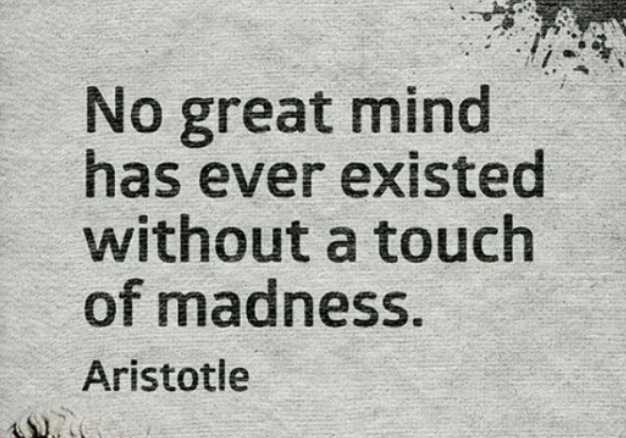“No great mind has ever existed without a touch of madness.” – Aristotle
When we see people do incredible things, it’s natural for us to want to know how exactly how they’ve done them.
We watch the news or follow world affairs and see people accomplishing incredible feats all the time, and one thought often plays in the back of our minds.
Could I do that?
We hear about the achievements of household names such as Albert Einstein, Nelson Mandela, Oprah Winfrey, Helen Keller and Mahatma Gandhi, and they seem otherworldly – superhuman almost.
But there isn’t anything divine about these people and what they’ve done. They simply have, by chance or intention (usually a bit of both), been able to develop great minds that they direct towards a certain goal.
And fortunately for us, there is a method to their genius, an anatomy to their thoughts, attitudes, and behaviors that we can try to replicate.
So here are 5 characteristics of the world’s greatest minds.

1. A clinical obsession with their field of study
The greatest minds don’t just have a fleeting interest in whatever they’re directing their attention to.
In fact, successful people from Charles Dickens to Nikola Tesla, Michelangelo to Beethoven and even Michael Jackson, all have one thing in common. There were all believed to have had obsessive-compulsive disorder (OCD)!
While this doesn’t mean you need to develop OCD to be successful, what it does mean is that geniuses are often walking the thin line between passion and obsession, and to become great you must become obsessed.
2. An intense belief in a higher purpose
Having a belief in a higher purpose is what drives anyone to unimaginable feats.
The purpose may be religious or it may not, it doesn’t matter. As long as it is something that is bigger than you and bigger than your own ego, it can fuel you to great heights.
Alexander Graham Bell, for example, was driven by his determination to find a way to allow his deaf mother to hear – this caused him to become one of the most prolific inventors of his time.
3. The focus of a monk
When geniuses focus their mind on something, they don’t get distracted.
With a higher purpose leading their ideas and visions, they have pin-point focus and are able to create goals, follow them, and course correct without getting caught off-track.
Another benefit of having such intense focus is that they don’t get dissuaded by the opinions of others in the same way most people do.
Steve Jobs is an example of someone who had incredible focus. Influenced heavily by Zen Buddhism, it was said that one of Jobs mantras was “focus and simplicity.”
He never let the criticism of others get in the way of his ideas, even when he was fired from the company he himself built, he stayed set on his vision. He was later re-hired and went on to build the culture-shifting Apple that we all know today.
4. A childlike curiosity
When we are children we are able to absorb everything like a sponge. Partly because our brains are still growing by also because we haven’t yet been conditioned out of our innate curiosity.
19th-century French poet Charles Baudelaire put it well when he said:
“Genius is nothing more nor less than childhood recaptured at will.”
When you are able to look at the world through the eyes of a child you will see links where everyone else may miss them. Your attitude will be more soft and playful and your ideas will be more vibrant and creative.
5. They keep a journal with them constantly
The world’s greatest minds get their thoughts out on paper. This allows them to refine them, separating the valuable from the not so valuable, and calming the tendency to become neurotic.
Everyone from John D. Rockefeller to John Adams, Benjamin Franklin to Winston Churchill, Virginia Woolf to Frida Kahlo, all kept a journal.
Richard Wiseman best explains why this works from a psychological perspective in his book 59 Seconds: Think a Little Change A lot:
“Thinking and writing are very different. Thinking can often be somewhat unstructured, disorganized, and even chaotic. In contrast, writing encourages the creation of a story line and structure that help people make sense of what has happened and work toward a solution. In short, talking can add to a sense of confusion, but writing provides a more systematic, solution-based approach.”
Brain Readers

